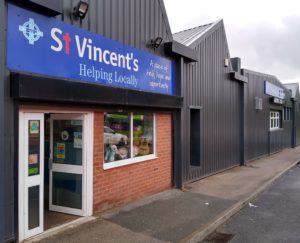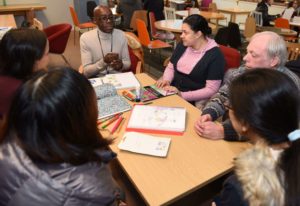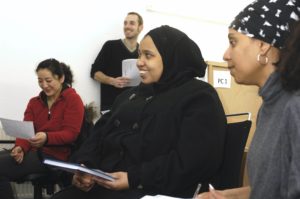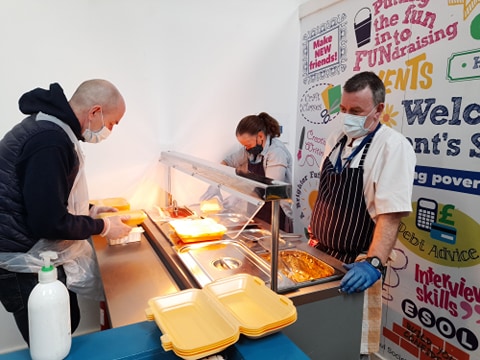We are pleased to share our first blogpost discussing how community organisations in the UK are supporting transnational families during the pandemic.
James Simpson, research team member, talks to Julie Linley, the Education Manager at project partner St Vincent’s in Leeds, UK, about how her work has changed since the onset of the Covid-19 pandemic.
Where do people turn if they lose their job overnight, or if the services they rely on for their day-to-day survival suddenly stop? For many in Leeds in the north of England, the answer is found at St Vincent’s, one of the UK collaborating partners on the Transnational Families in Europe project.

St Vincent’s is a charity that provides practical assistance to those in need, irrespective of ideology, faith, ethnicity, age or gender. It operates from its large community centre in a linguistically and culturally diverse inner-city area of east Leeds. The building has a busy charity shop, an open, airy space with racks and shelves piled high with recycled clothes, household goods, children’s toys and books. There is a community café too, and beyond that are offices, meeting rooms and classrooms. St Vincent’s runs a debt counselling advice service, a migrant support and immigration law service, and an extensive programme for the learning and teaching of English for Speakers of Other Languages (ESOL), catering for the language learning needs of Leeds’ new arrivals.
For many years, my own main interest has been adult migrant language education, as a teacher, a teacher-educator, and a researcher, and I have worked with St Vincent’s on several projects studying practice and policy in ESOL. More recently I have been involved in research with its immigration law service, gaining some knowledge of how, in the absence of government provision for initial immigration advice other than that relating to asylum claims, St Vincent’s has stepped in to fill the gap.
In May 2021 I spoke to Julie Linley, St Vincent’s Education Manager and Migrant Support Coordinator. Before the Covid-19 pandemic she had been managing a volunteer-led programme of ESOL, IT training and help-into-work coaching, and also coordinating wider support for people in the community, including the immigration law service. As she says, her work involved “real detailed and practical help for improving somebody’s immigration status or that of their families, and also wider things like helping somebody understand the complex systems and how they work, for example the benefits systems, applying for jobs, how to open a bank account, registering for a GP or a dentist.”

The activities of St Vincent’s, and Julie’s own role, have changed since the onset of the pandemic. An immediate major change was the adjustment of focus towards feeding people. Between April 2020 and March 2021, St Vincent’s provided over 15,000 hot lunches and nearly 12,000 box meals, and delivered 1,600 food parcels to local people. The organisation had to be responsive. As Julie remarks, “in time Leeds City Council had a neighbourhood response team, but it didn’t happen straight away, and when you’re hungry and need food, you can’t wait three months for something to be set up.”
The food service brought St Vincent’s into close contact with people who had never previously relied on organisations such as theirs. “People who’d never experienced unemployment before suddenly found that the pandemic had closed their business or they’d been made redundant suddenly, never expecting it might be them.” The work of feeding people in the neighbourhood was demanding for the staff team in many ways.
“There’d be quite a long socially distanced queue of people, and it would be at least 100 meals if not more. I can still remember handing food boxes to children my own children’s ages. It’s difficult for people to come and ask for that kind of help but to be physically giving these boxes to children, and seeing these families, is really really challenging. All of us in the centre found it emotionally challenging that this was the situation that our neighbourhood is in.”
Most of the people Julie works with can be considered transnational families, where some members of the family are separated by distance across international borders. Such families must deal with the opportunities and constraints of two or more national institutional settings, as well as processes and contexts that go across different national boundaries (Baldassar and Merla, 2014). Some are asylum seekers and refugees, placed in the area through government dispersal schemes, or who find themselves there through family and friendship ties. In other cases people might have come to the UK to join a family member, or might be hoping to invite other family members to join them in future.
Mobility for such transnational families has been constrained, not only by the Covid-19 pandemic but also by the restrictions on movement in and out of the EU following the implementation of Brexit at the beginning of 2021. EU citizens living in the UK now must register with the authorities if they wish to remain. In the past year, St Vincent’s has raised awareness of the EU Settlement Scheme with nearly two thousand people. The implications of Brexit and new immigration laws are a concern for many in the UK.
“They might potentially separate even more families,” says Julie, “so family reunion can be really difficult. I’ve had people share with me that they were able to invite their wife and their child over, but one of their children was 19. What do they do? Do they leave him alone or do they leave mum with him? It’s very difficult decisions people are making.”
She has found that families that were previously mobile cannot be any longer:
“Maybe somebody lived in Spain, some people lived in the UK, and there was quite a lot of movement. These things obviously stopped completely because of the Covid situation, but a lot of the movement that was happening before in deciding to where you’re going to reside, who’s going to reside with you, and who’s working where, these are big questions and things that don’t have easy answers. People have always had this idea that families live within one boundary,” she adds, “but that has never really been the case.”

At St Vincent’s, attention is paid to matters of language and communication, as part of the general stance taken by St Vincent’s towards enabling access. Staff are aware that communication difficulties are not purely associated with competence in English; the means by which people communicate, and inequalities in status, are issues too. “Services like the debt advice service, they would probably use an interpreter by telephone, which has limits because some people are not willing to speak in front of somebody they can’t physically see”.
“We have some trained volunteer interpreters who work to good practice guidelines for interpreting, and pick up any power imbalances that may or may not be taking place.”
The pandemic has been an extraordinary time, but St Vincent’s and other community organisations supporting transnational families will continue to respond to this and other situations as they emerge. “Changing what is needed at the right time is always necessary,” says Julie, “but that’s embedded in everything we always do. Everyone on the staff team is able to be flexible and to look at how we take away the barriers for people accessing services. One of the challenges is how do we move forward, and what are the needs, how do we best meet them. This continues to be the weekly question.”
In our Transnational Families research project, migrant peer researchers from St Vincent’s and the other collaborating organisations in the UK, Spain, France and Sweden will work with the project team to conduct interviews and participatory activities with different generations of transnational families. We will also co-produce tools and training materials that support families’ wellbeing and equality across generations.
Contact: James Simpson, jamesebsimpson@gmail.com (email) or @jebsim (twitter)
#TransnationalFamilies #RefugeeWeek2021
Reference
Baldassar, L. and Merla, L. (2014) Locating Transnational Care Circulation. In Baldassar, L. and Merla, L. Transnational Families, Migration and the Circulation of Care. London: Routledge, pp.25-58.

